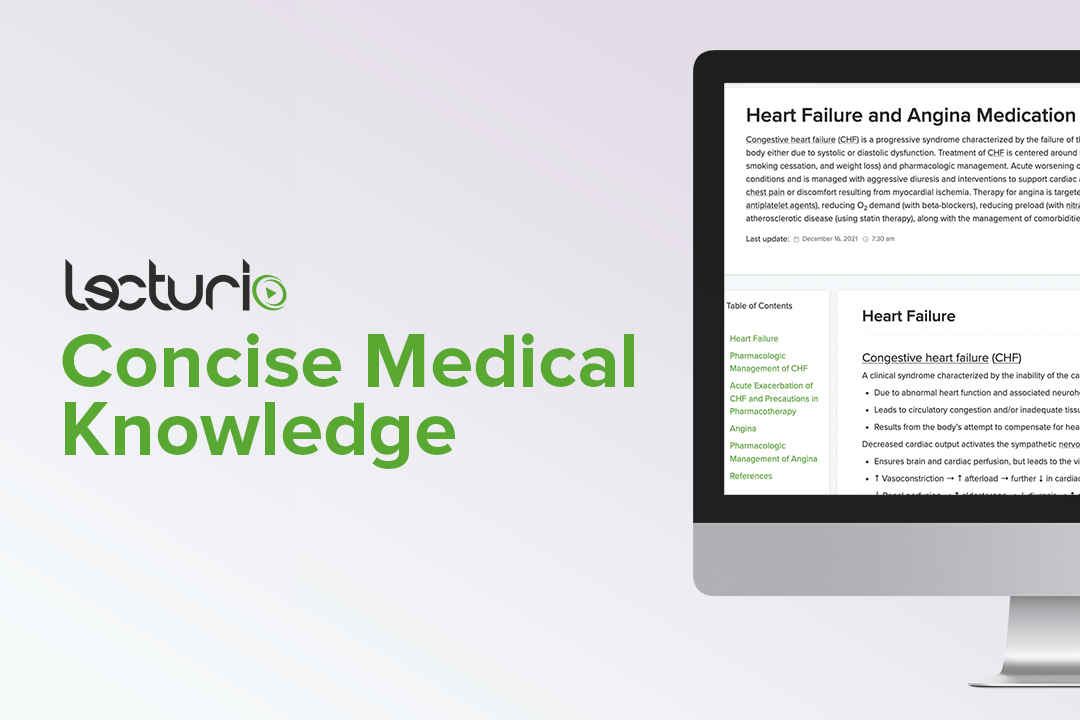Playlist
Show Playlist
Hide Playlist
Cardiac Depressants and Vasodilators – Heart Failure and Angina Management
-
Slides Cardiac Depressants Vasodilators Heart Failure Angina.pdf
-
Reference List Pharmacology.pdf
-
Download Lecture Overview
00:01 Welcome to Pharmacology by Lecturio. 00:04 Today, we're gonna be covering the management of angina. 00:07 Now, when we take a look at these different types of drugs, really what we're doing is we're either increasing blood flow to the affected area and therefore, more oxygen for the affected area. 00:18 Or B, we're reducing the oxygen demand of the affected area. 00:24 The first category of drugs that we're talking about today are the calcium channel blockers which actually do both. 00:30 Within the drug class itself, there's different agents and they will act more as a vasodilator and some will act more as a cardiac depressant. 00:40 The first sub-category of the calcium channel blockers are the dihydropyridine, calcium channel blockers. 00:48 These include drugs like amlodipine or felodipine, or nifedipine, which is the prototypical drug. 00:55 You don't need to know all of the names, just you know, I think nifedipine is probably reasonable. 01:01 This is usually used as a blood pressure drug, so 90% of the time that's why it's being given. 01:07 But it can be used quite effectively in angina management. 01:11 It may cause a reflex tachycardia, so that can cause an increase in oxygen demand. 01:18 So obviously a drug like nifedipine is predominantly a vasodilator not necessarily a cardiac depressant. 01:27 It may worsen proteinuria in some patients with underlying nephropathy so it's important for us to know that clearly. 01:38 The next category are the nondihydropyridine calcium channel blockers. 01:44 These are divided into two different categories which you probably don't need to know but for completeness' sake, I put them here. 01:52 Now, the first one that I wanna talk about is verapamil. 01:55 Verapamil is sold under very many different names, so I'm just gonna use the generic term. 02:00 It reduces inotropy and chronotropy, so you can see that unlike say nifedipine which is predominantly a vasodilator, this one is a predominantly a cardiac depressant. 02:13 It reduces the strength of contraction and it reduces the speed of conduction down certain tissues. 02:19 So, what happens is the oxygen demand actually goes down. 02:24 It reduces coronary vasospasm and therefore may help in ischemia. 02:30 The patient is treated for arrhythmia with this particular agent but it is also a really good treatment for patients who have angina. 02:41 Other categories of drugs within this subclass is diltiazem. 02:47 Now, diltiazem kind of shares features of both verapamil and nifedipine. 02:51 It's sort of the halfway drug. 02:53 So, it does act as a cardiac depressant, it does reduce heart rate, for sure. 02:57 But it also is a vasodilator. 02:59 So, the nice thing about using diltiazem is that you sometimes get the benefits of both. 03:05 Now, let's get back to talking about all of the calcium channel blockers as a group. 03:09 The side effects of calcium channel blockers include nausea, sometimes, you can get facial flushing so the vasodilation of the capillaries in the face, you can get dizziness sometimes and that dizziness is more often due to low blood pressure than any kind of a direct effect. 03:26 In terms of the dihydropyridines, like nifedipine and amlodipine, the side effects can include increased proteinuria, a reflex tachycardia, increased ischemia so it's a paradoxical kind of a thing because of the rapid heart rate, and a marked lowering of the blood pressure. 03:46 In terms of the Nondihydropyridines you get decreased proteinuria, you can have decreased ischemia, and you can have bradycardia and AV blocks, and sinus node depression when you're using these medications. 04:02 The other category of anti-anginals can be considered the beta-blockers. 04:07 Now, beta-blockers are often used in angina management, they're often used in post M.I. management too. 04:13 The prototypical and oldest of the beta-blockers is Propranolol, although, ironically we don't really use proplanolol anymore for the treatment of angina. 04:24 Beta-blockers in general reduce heart rate. 04:26 They reduce cardiac force and they reduce blood pressure. 04:30 Beta-blockers are most effective at preventing angina. 04:34 But they may also be used intravenously for severe acute angina in the absence of contraindications. 04:40 It is not useful against certain types of vasospastic angina, so you have to be careful when you're picking which patients you're going to treat with them.
About the Lecture
The lecture Cardiac Depressants and Vasodilators – Heart Failure and Angina Management by Pravin Shukle, MD is from the course Cardiovascular Pharmacology. It contains the following chapters:
- Cardiac Depressants
- Metabolic Rate Modifiers
Included Quiz Questions
What are two nondihydropyridine calcium channel blockers?
- Verapamil and diltiazem
- Nifedipine and felodipine
- Metoprolol and carvedilol
- Amiloride and triamterene
- Nifedipine and amlodipine
What is a common side effect of all calcium channel blockers?
- Dizziness
- Tinnitus
- Angioedema
- Hypertension
- Coronary artery vasospasm
Customer reviews
5,0 of 5 stars
| 5 Stars |
|
1 |
| 4 Stars |
|
0 |
| 3 Stars |
|
0 |
| 2 Stars |
|
0 |
| 1 Star |
|
0 |
Everything is clearly explained by the lecturer. In case of student´s questions, the lecturer gives a detailed answer. Thank you!




